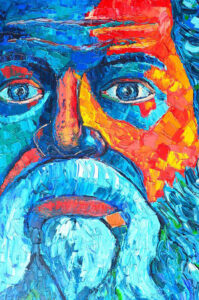Everything Not Said
I admire the courage and wisdom of Socrates
in everything he did, said, — and did not say.
This mocking and enamored
monster and pied piper of Athens,
who made the most overweening youths tremble and sob,
was not only the wisest chatterer of all time:
he was equally great in silence.
I wish he had remained taciturn
also at the last moment of his life;
in that case he might belong to a still higher order of spirits.
Whether it was death or the poison or piety or malice
something loosened his tongue at that moment
and he said: “O Crito, I owe Asclepius a rooster…”
–excerpt The Gay Science, Book 4, Section 340 by Friedrich Nietzsche
 One of the most moving pieces of prose is the Phaedo written by Plato. Socrates, Athenian senior citizen, veteran of the war with Sparta , stone-cutter by profession, resident and critic of his beloved city — is sentenced to death by the assembly for sedition. Or to express the accusation in ordinary language: for corrupting the youth. Plato composes a story of the last hour or so of Socrates life, surrounded by close friends, his last words were this instruction to Crito a dear friend. Preferring to take a dose of deadly hemlock, than to voluntary exile from his beloved city – his last words to Crito are a reminder to make a sacrifice to Asclepius the god of medicine, anticipating that his departure will be release/healing from this life.
One of the most moving pieces of prose is the Phaedo written by Plato. Socrates, Athenian senior citizen, veteran of the war with Sparta , stone-cutter by profession, resident and critic of his beloved city — is sentenced to death by the assembly for sedition. Or to express the accusation in ordinary language: for corrupting the youth. Plato composes a story of the last hour or so of Socrates life, surrounded by close friends, his last words were this instruction to Crito a dear friend. Preferring to take a dose of deadly hemlock, than to voluntary exile from his beloved city – his last words to Crito are a reminder to make a sacrifice to Asclepius the god of medicine, anticipating that his departure will be release/healing from this life.
Nietzsche expresses disappointment. According to Plato’s account, his teacher, fearlessly walked around Athens’ city square interrogating anyone who would listen about “truth,” “justice,” “beauty,” etc.. Socrates was a “free spirit,” one who robustly embraced a this-worldly POV. His non traditional spirituality gave the impression of atheism, with which he was charged at his trial.
Nietzsche is aghast that during his final moments of coherent awareness while hemlock takes numbing effect — Socrates indicates the god Asclepius is to be acknowledged for granting him relief.
Did Socrates mean that life is a dis-ease as Nietzsche writes? This life summed up as a net negative? Or did Socrates have another point in mind?
This ridiculous and terrible “last word”
means for those who have ears:
“0 Crito, life is a disease.”
Is it possible that a man like him,
who had lived cheerfully and
like a soldier in the sight of everyone,
should have been a pessimist?
He had merely kept a cheerful mien
while concealing all his life long his ultimate judgment,
his inmost feeling.
Socrates, Socrates suffered life!